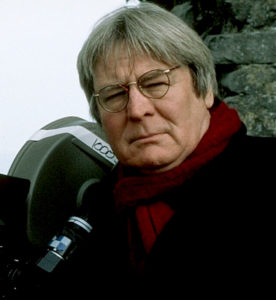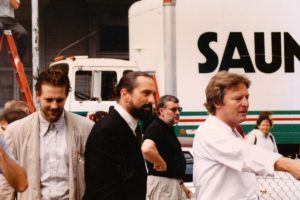 I was saddened to hear of the passing of the filmmaker Alan Parker, one of the most successful directors to emerge from Britain in the 1970s who transported his estimable talents across the pond, where he helmed such popular films as Midnight Express (1978), Fame (1980), Pink Floyd The Wall (1982), Mississippi Burning (1988), The Commitments (1991) and Evita (1996).
I was saddened to hear of the passing of the filmmaker Alan Parker, one of the most successful directors to emerge from Britain in the 1970s who transported his estimable talents across the pond, where he helmed such popular films as Midnight Express (1978), Fame (1980), Pink Floyd The Wall (1982), Mississippi Burning (1988), The Commitments (1991) and Evita (1996).
Parker died today, Friday, July 31, at the age of 76 in London following a long illness, according to his family.
Bringing to Hollywood the immaculately stylized visual sense that he honed as a commercial director in Britain in the late Sixties and early Seventies (alongside fellow Brits Adrian Lyne and Ridley Scott), Parker’s skills as a cinematic storyteller only grew stronger and more clearly defined as the years passed, beginning with his first Hollywood venture, 1976’s Bugsy Malone, up through his final feature, 2003’s The Life of David Gale.
I had the opportunity to speak on the phone with Mr. Parker several years back on the occasion of a DVD reissue of Midnight Express. We talked British filmmakers taking on American subjects, DVD and supplement materials and memorable prison films. It was a brief chat, but I was thrilled to be able to tell him how much I dug his work, particularly 1982’s Shoot the Moon and 1987’s Angel Heart.
DISC DISH: You’re an England-born filmmaker who’s well-known for taking on films with distinctly American stories and themes. How do your English filmmaking talents, styles and perceptions lend themselves to creating such “American” movies.
ALAN PARKER: Well, I grew up on a diet of American movies and so graduated quite naturally to American subjects. The American film industry has always embraced filmmakers from abroad ever since the early days of Hollywood, so I was not alone. There is the theory that if you’re one step outside of a society, perhaps you can look at the world with some clarity and objectivity. Also, I have always been comfortable with the American vernacular. I always think I write better in “American English” than “English English.”
DD: Midnight Express is considered to be one of the cinema’s great prison films. What are your favorite prison films?
AP: I think Cool Hand Luke and The Shawshank Redemption probably are my favorites. Yes, those two.
DD: Looking back on Midnight Express, which you directed nearly thirty years ago, what about it, if anything, would you change in it now? Any regrets?
AP: Well, it was made when I was quite young. It was my second film. Also, it was Oliver Stone’s first credited screenplay and no doubt wisdom comes from a certain maturity. We were young filmmakers hell-bent on telling a good story about what we saw as an injustice of a disparate legal and prison system, and in our zeal to make our point, maybe a little light and shade got lost. The “good guy” Turks got left out. But the raw energy and uncompromising visceral power of the film still remains fresh and modern, which also came from the same youthful enthusiasm, single-mindedness and naiveté.
DD: You contribute quite a lot to the DVD editions of your films—commentaries, interviews, featurettes—which is not something every veteran director enjoys doing. What is it about explaining your intentions, methods and style to audiences that you find appealing?
AP: Well, DVDs—or versions of DVDs—are going to around for a long time, so it’s night to get it right. Before this format, the historical accuracy of how a film was made was often rather sketchy and often in the hands of people who weren’t actually there. Sony is particularly good at allowing filmmakers back into the process. For Midnight Express, I have re-graded the film and re-done the sound and so it probably looks as good and sounds as good, if not better, than the original version. It’s been thirty years, so it was interesting creatively to revisit it.

Leave a Reply